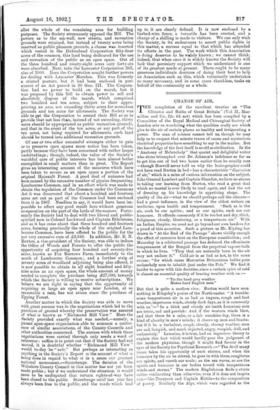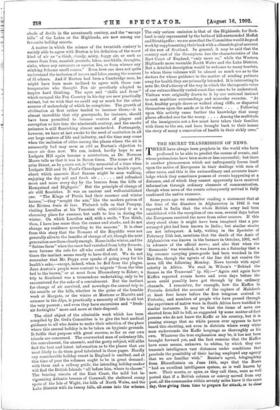CHANGE OF AIR.. T HE completion of the excellent treatise on
"The Climates and Baths of Great Britain" (Vol. II., Mac- millan and Co., 12s. 6d. net) which has been compiled by a Committee of the Royal Medical and Chirurgical Society of
London sets us wondering what the qualities really are which
give to the air of certain places so healthy and invigorating a power. The man of science cannot tell us, though be may help us to suspect that minute traces of ozone and mysterious electrical properties have something to say in the matter. But the knowledge of the fact itself is as old as civilisation. In the " Anatomy of Melancholy" that quaint and delightful writer who alone triumphed over Dr. Johnson's indolence so far as to get him out of bed two hours earlier than he usually rose —though Boswell never told us why the lexicographer could not have read Burton in bed—has a characteristic "digression of air," which is a mine of curious information on the subject. Like General Lambert and Captain Shandon, we have no shame in taking our learning from Burton, who read a great deal which no mortal is ever likely to read again, and had the art of dressing up his knowledge in appetising shape. The quality of the air—what we should perhaps call the climate— had a great influence, in the view of the oldest writers on medicine, upon health and temperament. "Such as is the air, such be our spirits ; and as our spirits, such are our humours. It offends commonly if it be too hot and dry, thick, fuliginous, cloudy, blustering, or a tempestuous air." With an Indian Empire, we need not go beyond our own borders for a proof of this assertion. Such a picture as Mr. Kipling has drawn in " At the End of the Passage " shows vividly enough the effect of excessive heat on the European constitution; and Macaulay in a celebrated passage has deduced the effeminate temperament of the Bengali from the perpetual vapour-bath in which he lives. " They that are naturally born in the air may not endure it." Cold air is as bad as hot, in the same excess : "for which cause Mercurius Britannicus belike puts melancholy men to inhabit just under the Pole." We find it harder to agree with this doctrine, since a certain spice of cold is almost an essential quality of bracing weather with us :—
"'Tis the hard grey weather Makes hard English men."
But that is quite a modern view. Burton would have seen nothing in Kingsley's praise of the North-easter. "A trouble- some tempestuous air is as bad as impure, rough and foul weather, impetuous winds, cloudy dark days, as it is commonly with us."—" In a thick and cloudy air (saith Lemnius) men are tetric, sad and peevish : And if the western winds blow, and that there be a calm, or a fair sunshine day, there is a kind of alacrity in men's minds ; it cheers up men and beasts: but if it be a turbulent, rough, cloudy, stormy weather, men are sad, lumpish, and much dejected, angry, waspish, dull, and melancholy." Lemnius, it is true, had an ingenious theory to explain this fact which would hardly pass the judgment of the modern physician, though it might find favour in the eyes of the Society for Psychical Research :—" The devil many times takes his opportunity of such storms, and when the humours by the air be stirred, he goes in with them, exagitates our spirits, and vexeth our souls ; as the sea waves, so are the spirits and humours in our bodies tossed with tempestuous winds and storms." The modern Englishman finds a storm rather exhilarating than otherwise, even if it does not inspire him—like Tennyson and Captain Kettle—to the composition of poetry. Similarly the Alps, which were regarded as the
abode of devils in the seventeenth century, and the "savage hills" of the Lakes or the Highlands, are now among our favourite holiday resorts.
A matter in which the science of the twentieth century is mainly able to agree with Burton is his definition of the worst kind of air as "a thick, cloudy, misty, foggy air, or such as comes from fens, moorish grounds, lakes, muckhills, draughts, sinks, where any carcassca or carrion lies, or from whence any stinking fulsome smell comes." Even here one does not quite understand the inclusion of moors and lakes among the sources of ill odours. And if Burton had been a Cambridge man, he might have been more inclined to agree with those con- temporaries who thought Fen air peculiarly adapted to inspire hard thinking. The ague and "chills and fever" which ravaged the Fen Country in his day are now practically extinct, but we wish that we could say as much for the other sources of melancholy of which he complains. The growth of civilisation at first rather tended to increase these,—it is almost incredible that city graveyards, for instance, should have been permitted to become centres of plague and corruption so late into the nineteenth century, and the smoke nuisance is still flourishing almost unchecked. Fortunately, however, we have at last awoke to the need of sanitation in all our large centres of life and industry, and the time may come when the inclusion of cities among the places where the air is necessarily bad may seem as odd as Burton's objection to moor air does now. We can, indeed, hardly hope to see Ludgate Hill again become a sanatorium, as Dr. Norman Moore tells us that it was in Saxon times. The name of Pil- grim Street, as he points out, is "the memorial of a time when Ludgate Hill and St. Paul's Churchyard were a health resort, about which anaemic East Saxons might be seen walking, enjoying the dry soil and fresh air and refreshed more and more every day by the breezes from the hills of Hampstead and Highgate." But the principle of change of air still flourishes. It was an ancient and well-established one. " The Kings of Persia had their summer and winter houses,"—they " sought the sun," like the modern patron of the Riviera train de luxe. Plutarch tells us that Pompey, visiting Lucullus at his Tusculan villa, criticised it as a charming place for summer, but unfit to live in during the winter. On which Lucullus said, with a smile, " You think, then, I have less sense than the cranes and storks, and do not change my residence according to the seasons." It is clear from this story that the Romans of the Republic were not generally alive to the benefits of change of air, though the next generation saw them clearly enough. Rome in the winter, and the " Sabine farm" when the snow had vanished from lofty Soracte, soon became the rule for all who could afford it. In later times the instinct seems nearly to have died out. We do not remember that Mr. Pepys ever speaks of going away for his health's sake,—except, indeed, when he fled from the plague. Jane Austen's people were content to migrate "from the blue bed to the brown," or at most from Bloomsbury to Esher; a trip to Southend was a tremendous undertaking, only to be encountered for the sake of a convalescent. But the instinct for change of air survived, and nowadays the annual trip to the seaside or the hills, whether in the guise of the humble week at Margate, or the winter at Mentone or Biarritz and summer in the Alps, is practically a necessity of life to all but the very poorest ; and even they have excursions and " fresh- air fortnights " more and more at their disposal.
The chief object of the admirable work which has been compiled by Dr. Ord's Committee is to give the best medical guidance to all who desire to make their selection of the place where this annual holiday is to be taken on hygienic grounds. It fulfils that purpose with great success, so far as our own islands are concerned. The overworked man of sedentary life, the convalescent, the anaemic, and the gouty subject, will alike find the best and latest information as to the places that are most likely to do them good tabulated in these pages. Hardly any considerable holiday resort in England is omitted, and at this time of year the volumes ought to be in great demand: with them and a railway guide, the intending holiday-maker will find the British Islands " all before him, where to choose." The bracing resorts of the East Coast, the mild but in- vigorating Atlantic breezes of Cornwall, the sheltered sunny spots of the Isle of Wight, the hills of North Wales, and the Lake District with its breezy fells, all come into the scheme. The only serious omission is that of the Highlands, for Scot- land is only represented by the baths of hill-surrounded Moffat and Strathpeffer: we are sure that the Committee would do good work by supplementing their book with a climatological account of the rest of Scotland. In general, it may be said that the country east of the Grampians has the characteristics of the East Coast of England, " only more so," while the Western Highlands more resemble North Wales and the Lake District. But a detailed description would be welcome to many tourists, to whom these volumes will be almost as much use as to the doctors for whose guidance in the matter of sending patients away for health they are primarily intended. It is interesting to note Dr. Ord's theory of the way in which the therapeutic value of our extraordinarily varied coast-line came to be understood,. Visitors were originally drawn to it by our national instinct to seek maritime surroundings and muscular exercise. " At first, healthy people drove or walked along cliffs, or disported themselves upon the sands or in the water. . . . . Following upon this activity came further the knowledge that many places afforded rest for the weary Among the multitude of the immigrants not a few must have taken their families with them to the sea, and have brought back to their homes the story of many a renovation of health in their sickly ones."



































 Previous page
Previous page